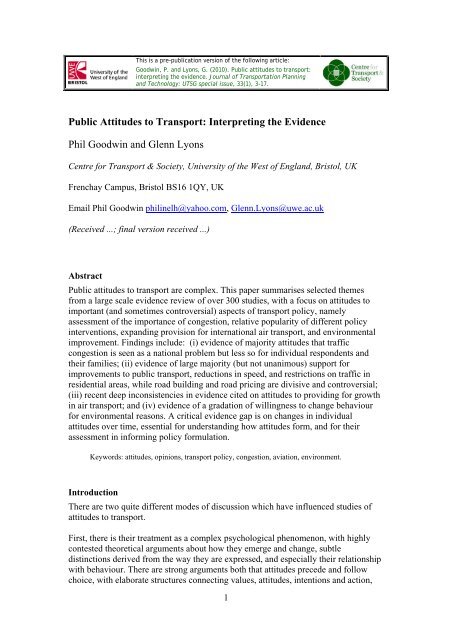Goodwin, P. and Lyons, G. (2009) Public attitudes to transport ...
Goodwin, P. and Lyons, G. (2009) Public attitudes to transport ...
Goodwin, P. and Lyons, G. (2009) Public attitudes to transport ...
Create successful ePaper yourself
Turn your PDF publications into a flip-book with our unique Google optimized e-Paper software.
This is a pre-publication version of the following article:<br />
<strong>Goodwin</strong>, P. <strong>and</strong> <strong>Lyons</strong>, G. (2010). <strong>Public</strong> <strong>attitudes</strong> <strong>to</strong> <strong>transport</strong>:<br />
interpreting the evidence. Journal of Transportation Planning<br />
<strong>and</strong> Technology: UTSG special issue, 33(1), 3-17.<br />
<strong>Public</strong> Attitudes <strong>to</strong> Transport: Interpreting the Evidence<br />
Phil <strong>Goodwin</strong> <strong>and</strong> Glenn <strong>Lyons</strong><br />
Centre for Transport & Society, University of the West of Engl<strong>and</strong>, Bris<strong>to</strong>l, UK<br />
Frenchay Campus, Bris<strong>to</strong>l BS16 1QY, UK<br />
Email Phil <strong>Goodwin</strong> philinelh@yahoo.com, Glenn.<strong>Lyons</strong>@uwe.ac.uk<br />
(Received ...; final version received ...)<br />
Abstract<br />
<strong>Public</strong> <strong>attitudes</strong> <strong>to</strong> <strong>transport</strong> are complex. This paper summarises selected themes<br />
from a large scale evidence review of over 300 studies, with a focus on <strong>attitudes</strong> <strong>to</strong><br />
important (<strong>and</strong> sometimes controversial) aspects of <strong>transport</strong> policy, namely<br />
assessment of the importance of congestion, relative popularity of different policy<br />
interventions, exp<strong>and</strong>ing provision for international air <strong>transport</strong>, <strong>and</strong> environmental<br />
improvement. Findings include: (i) evidence of majority <strong>attitudes</strong> that traffic<br />
congestion is seen as a national problem but less so for individual respondents <strong>and</strong><br />
their families; (ii) evidence of large majority (but not unanimous) support for<br />
improvements <strong>to</strong> public <strong>transport</strong>, reductions in speed, <strong>and</strong> restrictions on traffic in<br />
residential areas, while road building <strong>and</strong> road pricing are divisive <strong>and</strong> controversial;<br />
(iii) recent deep inconsistencies in evidence cited on <strong>attitudes</strong> <strong>to</strong> providing for growth<br />
in air <strong>transport</strong>; <strong>and</strong> (iv) evidence of a gradation of willingness <strong>to</strong> change behaviour<br />
for environmental reasons. A critical evidence gap is on changes in individual<br />
<strong>attitudes</strong> over time, essential for underst<strong>and</strong>ing how <strong>attitudes</strong> form, <strong>and</strong> for their<br />
assessment in informing policy formulation.<br />
Keywords: <strong>attitudes</strong>, opinions, <strong>transport</strong> policy, congestion, aviation, environment.<br />
Introduction<br />
There are two quite different modes of discussion which have influenced studies of<br />
<strong>attitudes</strong> <strong>to</strong> <strong>transport</strong>.<br />
First, there is their treatment as a complex psychological phenomenon, with highly<br />
contested theoretical arguments about how they emerge <strong>and</strong> change, subtle<br />
distinctions derived from the way they are expressed, <strong>and</strong> especially their relationship<br />
with behaviour. There are strong arguments both that <strong>attitudes</strong> precede <strong>and</strong> follow<br />
choice, with elaborate structures connecting values, <strong>attitudes</strong>, intentions <strong>and</strong> action,<br />
1

















